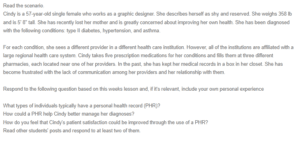The Benefits of Personal Health Records
Individuals who are proactive about managing their health and medical information often maintain a personal health record (PHR). Typically, these are individuals with chronic health conditions requiring frequent medical attention or caregivers managing multiple health records. Additionally, those who want easy access to their health data for personal management also maintain a PHR. Health-conscious individuals concerned with preventive care and wellness may maintain a PHR. As for personal experience, I’ve seen family members with chronic illnesses meticulously maintain PHRs to track their medical history, medications, and appointments. This allows them to actively participate in their healthcare decisions and coordinate with healthcare providers effectively. Need help with your assignment ? Reach out to us. We offer excellent services.
A PHR could significantly help Cindy manage her multiple diagnoses. Furthermore, it could improve her healthcare experience. First, it would provide a centralized platform for her to store and access all her medical records (Chen et al., 2019). This would include test results, medication lists, and treatment plans. Therefore, communication will be streamlined among her various healthcare providers, and frustration caused by their lack of coordination will be reduced. Cindy can better advocate for her health by having all her information in one place. Furthermore, integrated care will easily be facilitated as PHRs empower individuals to become active participants in their healthcare. Moreover, they foster a stronger patient-provider relationship and ultimately lead to better health outcomes, which will be especially valuable for Cindy in her current situation.
Cindy’s patient satisfaction can significantly be enhanced through the use of a PHR, as it would promote better coordination and communication among her healthcare providers, thus reducing the frustration she’s experienced due to their lack of collaboration. Additionally, Cindy would feel more in control of her health and better equipped to actively engage with her providers. This is because all her medical information is readily accessible in one place. This increased involvement in her care can lead to a stronger patient-provider relationship and a sense of being heard and understood (Drossman & Ruddy, 2020). It will ultimately improve her overall satisfaction with the healthcare system. Notably, patients who use PHRs report higher levels of satisfaction due to the improved convenience and transparency in their healthcare management.
References
Chen, Y., Ding, S., Xu, Z., Zheng, H., & Yang, S. (2019). Blockchain-based medical records secure storage and medical service framework. Journal of Medical Systems, 43, 1-9. https://doi.org/10.1007/s10916-018-1121-4
Drossman, D. A., & Ruddy, J. (2020). Improving patient-provider relationships to improve health care. Clinical Gastroenterology and Hepatology, 18(7), 1417-1426. https://doi.org/10.1016/j.cgh.2019.12.007
ORDER A PLAGIARISM-FREE PAPER HERE
We’ll write everything from scratch
Question

The Benefits of Personal Health Records
Read the scenario.
Cindy is a 57-year-old single female who works as a graphic designer. She describes herself as shy and reserved. She weighs 358 lb and is 5′ 8″ tall. She has recently lost her mother and is greatly concerned about improving her own health. She has been diagnosed with the following conditions: type II diabetes, hypertension, and asthma.
For each condition, she sees a different provider in a different healthcare institution. However, all of the institutions are affiliated with a large regional healthcare system. Cindy takes five prescription medications for her conditions and fills them at three different pharmacies, each located near one of her providers. In the past, she has kept her medical records in a box in her closet. She has become frustrated with the lack of communication among her providers and her relationship with them.
Respond to the following question based on this weeks lesson and, if it’s relevant, include your own personal experience
What types of individuals typically have a personal health record (PHR)?
How could a PHR help Cindy better manage her diagnoses?
How do you feel that Cindy’s patient satisfaction could be improved through the use of a PHR?
Read other students’ posts and respond to at least two of them.

